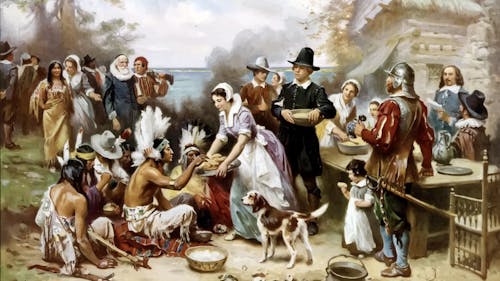Don't forget racist origins of Thanksgiving

The origins of Thanksgiving run deep in American culture, making it an established and fortified holiday. More than 100 million people shop in person on Thanksgiving. Approximately 46 million turkeys are consumed on Thanksgiving.
In recent years, holidays such as Black Friday and Cyber Monday have taken a more important role alongside Thanksgiving, and people spend approximately $3 billion dollars on both days respectively. As such a staple in American culture, the ethics behind the popular holiday should be re-examined and discussed.
In September 1620, the Mayflower left with 102 passengers to escape religious persecution from their native homeland of Plymouth, England. After a 66-day journey, they landed near Cape Cod and began to establish a village near Massachusetts.
Their first winter lead to approximately half of the Mayflower’s original crew to die, but their fortunes changed in March when a settler brought back a Native American named Squanto to help the remaining colonists. Squanto taught the Pilgrims how to cultivate corn and catch fish in the rivers, and he also showed them how to avoid poisonous plants and create a successful colony.
The first corn harvest was successful, and as a gesture of gratitude, William Bradford organized a celebratory feast and invited Squanto and a mixture of Native American allies to join them.
The feast lasted for three days and was cooked by mostly traditional Native American methods, as ovens did not exist. Pilgrim Edward Winslow provides a written record of the event which most historians use as a blueprint for intricate details behind the feast.
George Washington and his successors officially designated days of thanks held during their presidencies, so the precedent was ready for it to be made into a national holiday. Their reasoning behind it was to celebrate the country’s state of independence from Great Britain and the ratification of the Constitution.
While Thanksgiving originally occurred in 1621, it wasn't until 1863 that President Abraham Lincoln officially recognized it as a national holiday.
While the day of the feast was certainly important, it fails to capture the true extent of how the colonists treated Native Americans. After their celebrated feast, they massacred much of the Native American population, ravaging their settlements and exposing their population to diseases that were common in England but unheard of on native soil.
The arrival of Christopher Columbus onto American soil in 1492 marked the beginning of genocide of the Native American population due to exposure of diseases and ill-treatment. His own journal documents his escapades, and he described the them as “timid and full of fear.”
Colonizers took advantage of their generosity and kindness. Most of the population was either wiped out by settlers or put on reservations to have their land excavated for resources.
The unhealthy paradox of celebrating a holiday centered around gratitude while simultaneously ignoring the horrific ways the Native American population was exploited, murdered and relocated, is something vile and arguably uniquely American.
While Indigenous People’s Day has been created as a remembrance of Native American culture and a reminder of many of the Native American communities which were exterminated by the colonists, it is still not as widely known as Columbus or Christmas.
While Thanksgiving will never fully disappear from American culture, it should be celebrated without ignoring the genocide of Native Americans. Schools regularly refuse to teach the true aspect of the history behind Thanksgiving, and that creates a generation of children who are unaware of their own history.
It's morally wrong but unsurprising that history is told from the side of the winners, but we cannot forget the persecution and struggles that Native Americans faced after their feast with the Pilgrims.



